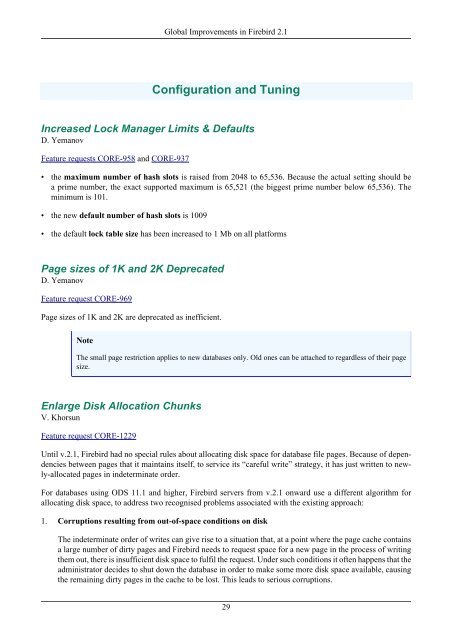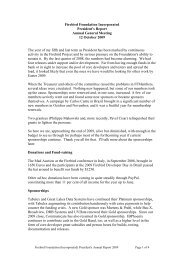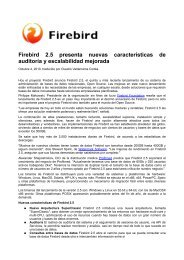Firebird 2.1 Release Notes
Firebird 2.1 Release Notes
Firebird 2.1 Release Notes
Create successful ePaper yourself
Turn your PDF publications into a flip-book with our unique Google optimized e-Paper software.
Global Improvements in <strong>Firebird</strong> <strong>2.1</strong><br />
Configuration and Tuning<br />
Increased Lock Manager Limits & Defaults<br />
D. Yemanov<br />
Feature requests CORE-958 and CORE-937<br />
• the maximum number of hash slots is raised from 2048 to 65,536. Because the actual setting should be<br />
a prime number, the exact supported maximum is 65,521 (the biggest prime number below 65,536). The<br />
minimum is 101.<br />
• the new default number of hash slots is 1009<br />
• the default lock table size has been increased to 1 Mb on all platforms<br />
Page sizes of 1K and 2K Deprecated<br />
D. Yemanov<br />
Feature request CORE-969<br />
Page sizes of 1K and 2K are deprecated as inefficient.<br />
Note<br />
The small page restriction applies to new databases only. Old ones can be attached to regardless of their page<br />
size.<br />
Enlarge Disk Allocation Chunks<br />
V. Khorsun<br />
Feature request CORE-1229<br />
Until v.<strong>2.1</strong>, <strong>Firebird</strong> had no special rules about allocating disk space for database file pages. Because of dependencies<br />
between pages that it maintains itself, to service its “careful write” strategy, it has just written to newly-allocated<br />
pages in indeterminate order.<br />
For databases using ODS 11.1 and higher, <strong>Firebird</strong> servers from v.<strong>2.1</strong> onward use a different algorithm for<br />
allocating disk space, to address two recognised problems associated with the existing approach:<br />
1. Corruptions resulting from out-of-space conditions on disk<br />
The indeterminate order of writes can give rise to a situation that, at a point where the page cache contains<br />
a large number of dirty pages and <strong>Firebird</strong> needs to request space for a new page in the process of writing<br />
them out, there is insufficient disk space to fulfil the request. Under such conditions it often happens that the<br />
administrator decides to shut down the database in order to make some more disk space available, causing<br />
the remaining dirty pages in the cache to be lost. This leads to serious corruptions.<br />
29
















